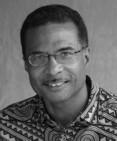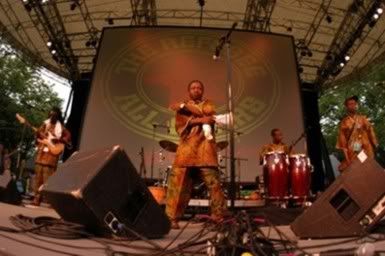The Refugee All-Stars and the Power of Music
Be sure to check out Zach Niles and Banker White's award-winning film "The Refugee All-Stars" and buy the All-Stars new CD "Living Like a Refugee." It's great music and it's bound to make you feel good... My favorite title is "Garbage to the Showglass," an ironic, supremely joyful chant about their improbable rise to fame. "They found us in the garbage, and put us in a showglass in the biggy biggy time..." "Black Nature" delivers a wickedly beautiful rap about God with interwoven English, Krio, French and African inflections, and everyone jumps in verse-by-verse to sing their own story.
The Refugee All-Stars and the Power of Music
Reuben Koroma has known the terrible depth of suffering and grief in Africa, yet his music has carried him from hopelessness to heights of abounding joy and ecstasy.
As a refugee from the diamond killing fields of Sierra Leone’s decade-long civil war, Koroma was one of some 2 million displaced people who witnessed one of the world’s most gruesome conflicts, a war full of horrid atrocities. Throughout the 1990s tens of thousands Sierra Leoneans were killed or maimed as the ruthless Revolutionary United Front (RUF) rebel forces made a brutal bid for political power and control of the country’s lucrative diamond trade.
Yet in the midst of the horror, seeds were being sown for an astounding breakthrough for Koroma and his music. In 1999 at Sembakounya Refugee Camp, deep in rural Guinea, Koroma found Franco Langba and Arahim Kamara, fellow musicians he knew and had jammed with in Freetown. With an old, beat-up guitar and makeshift drums, the artists began playing music to entertain and uplift the spirits of their fellow refugees. They were eventually joined by six others – including a rapper – and created their own spirited blend of reggae, R&B, hip hop and West African genres, dubbing themselves “The Refugee All-Stars.”
American filmmakers Zach Niles and Banker White happened upon the Refugee All-Stars in 2002 while they were traveling through Guinea, seeking to make a documentary on the devastation of the civil war. With financial help from some high profile celebrities including Keith Richards, Bob Geldof, Graham Nash and Steve Tyler and Joe Perry from Aerosmith, Niles and White followed the Refugee All-Stars for three years as the band performed in various refugee camps and grappled with the prospect of returning home to Freetown. With the assistance of the United Nations High Commission for Refugees (UNHCR), the band members visited Freetown and then returned to the refugee camps to spread the word that the war was “done-done” and Freetown was safe once again. By mid-2004 Koroma and the All-Stars were back in Freetown recording their first album, “Living Like a Refugee,” at Island Studios, a sparse one-man operation run by Sam Jones, an easy-going British expatriate.
“The Refugee All-Stars,” Niles and White’s sensitive and poignant film was released in 2005 and won numerous national and international film festival awards while introducing the Refugee All-Stars and their music to enthusiastic audiences. Beginning with their performance in March at the South by Southwest Film Festival in Austin, Koroma and his band have captivated crowds with the irrepressible joy and energy of their unique sound. The groundbreaking Austin gig was punctuated with dynamic summer concerts throughout the US, Canada and Japan. The Refugee All-Stars current 26-city tour hits the Boulder Theater on November 7, and includes December concert appearances in London and Paris.
All of the band members have faced horrific tragedies, and some of them even had limbs cut off by the rebels. (Amnesty International estimates that the RUF mutilated about some 20,000 people in Sierra Leone, hacking off hands, arms and legs with machetes and axes, to terrorize people into working the diamond fields.) The soft-spoken Koroma – who witnessed his mother and father being killed during the war – is utterly amazed at the All-Stars’ journey from jamming in isolated rural refugee camps to polished stage performances at large international music festivals.
“My life was very bad a few years ago in the refugee camp – I was suffering in very bad conditions and I didn’t have something to hope for. But now things are really happening for the Refugee All-Stars,” Koroma said during a phone interview, in his soulful, rhythmic Krio English. “I believe this kind of success is a very good thing for us, and we feel important – we feel successful. I always feel good that I have been able to achieve and have many of the things that I was dreaming.”
From the 19 year-old rapper “Black Nature” to the silver-haired elder rasta Ashade Pearce, the Refugee All-Stars have a unique, eclectic sound that holds together diverse influences. Their album, “Living Like a Refugee” – released in the US in September on Anti Records – blends the familiar flavors of reggae and hip hop with rhythms and tones that are more deeply African and unfamiliar. While Koroma’s lyrics tell the story of the war, life in the refugee camps and themes of oppression, love and compassion, the music itself does not bear a hint of sadness. It’s clear – as Koroma points out – that music is intended to heal.
“It’s because of the love of music that we get together and then despite all of the struggles, all the constraints we are facing, we still really have some happiness within our hearts.” Koroma says, describing their music as a kind of therapy and having the power to heal trauma. “It’s treatment for us, because when we play music it feels like most of our problems are minimized. And then not only for us, but we saw hundreds of thousands of refugees were interested in listening to us. And then I think to myself, this might help them to minimize their problems, because everybody in the refugee camp has psychological problems.”
From the moment the Refugee All-Stars set foot in the United States, their music has taken the Western world by storm, and the band found itself thrown into a whirlwind of music industry machinations. Their very first performance at Austin’s South by Southwest Festival led to an on-the-spot negotiation for a major tour and promotion deal with the Rosebud Agency. With the tremendous buzz being generated by their concerts and the “Living Like a Refugee” CD, it seems that the Refugee All-Stars are on track to emulate the success of the Buena Vista Supper Club, the Cuban artists who sold millions of CDs worldwide after being propelled to fame through a film documentary by famed musician and impresario Ry Cooder.
While the Refugee All-Stars have electrified crowds at Central Park in New York and the Kennedy Center in Washington, D.C., Koroma describes a peak experience in Niigata, Japan at the Fuji Rock Festival, where the band’s music appeared to break cultural barriers.
“Before we played people were telling us that it’s difficult for Japanese people to dance to music – they like listening but they don’t normally dance to international music. But when we came on stage we saw that more than 4,000 or 5,000 people were dancing,” Koroma said, barely able to contain his enthusiasm as his voice rose in excitement. “Everybody was dancing –it was like magic! I just thought it was wonderful, because I was not expecting that. I was just expecting 10, or three or five people would dance and the others would sit. To my surprise I saw everybody dancing, people coming from all different directions.”
Koroma is optimistic about the future of Sierra Leone and the impact the Refugee All-Stars are making on their local music scene and international music. He says that before the war there was only one radio station in Sierra Leone, and now there are six in Freetown, and each regional district has its own radio station. He also says that the people of Sierra Leone are “very, very proud” of the All-Stars for “making history in the world,” and as a result local musicians are gravitating toward playing instruments and live music as opposed to computerized, digital songs.
Koroma likes to point out that the Refugee All-Stars are revolutionizing music by introducing certain indigenous West African rhythms to the rest of the world.
“We have a traditional beat that is called the goombay beat, and we have another traditional beat in Sierra Leone that is called muktivange,” Koroma explains, adding that goombay is specific to Sierra Leone when muktivange is played all over West Africa. “This kind of beat (goombay) is really a traditional beat that has never been exposed in the Western world, and we are trying to do that. We are playing it one of the sounds on our album, “Ya N’Digba.”
To their credit, the Refugee All-Stars have demonstrated the resilience of Africa and the extraordinary power of music to heal and transform human emotions. Their triumph over adversity and their boundless optimism offers a much-needed ray of light in world of escalating conflict, fear and violence.
For more information on the Refugee All-Stars visit www.refugeeallstars.org.



0 Comments:
Post a Comment
<< Home